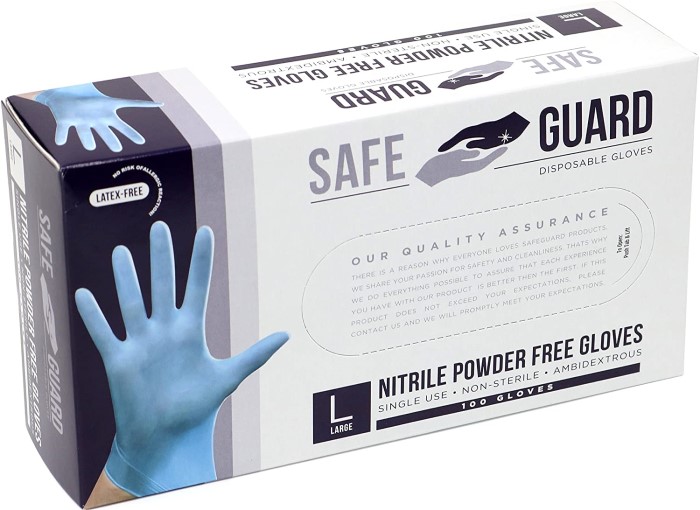COVID-19 caused demand for personal protective equipment (PPE) to skyrocket, including face shields, goggles, and masks. Many people have also started regularly wearing disposable medical gloves.
Now that people have stockpiled gloves at home, we’ve been asked “do medical gloves expire?”
The short answer is that if you don’t notice anything odd about them, such as discoloration or a loss of elasticity, then they’re probably fine. Summary:
- Exposure to air, light, or heat will degrade the material over time.
- Latex gloves have a stated shelf life of 3 years.
- Nitrile, polyvinyl chloride (vinyl), neoprene, and polyurethane gloves have a shelf life of 5 years.
- In practice, properly stored gloves have been known to last 10 years in storage.
- Non-sterile disposable gloves are not required by the FDA to have expiration date labeling, however some manufacturers will put a date. Sterile gloves should be labeled with an expiration date.
- Gloves that have exceeded their shelf life can be used as long as they are in good condition.
- If you are leery about using gloves that have exceeded their shelf life, use them for training, cleaning, gardening, or some other non-sterile task.
- Gloves should be left in their original packaging until it is time to use them. This will protect them from ultraviolet radiation, moisture, and ozone.
- Tearing, breaking, loss of elasticity, and surface cracks are all signs that gloves are not fit for use.
Glove materials
Most medical gloves are made from latex, nitrile, neoprene, polyurethane, or polyvinyl chloride. Let’s take a look at the most common materials of medical gloves.
Latex is a natural polymer that is commonly found in flowering plants, however the latex used in medical gloves come from rubber trees. Latex is a common glove material, but due to the natural proteins in latex, people can develop allergic reactions that can run from irritation to anaphylactic shock. Because of this risk, hospitals are opting to carry non-latex gloves made of nitrile or polyvinyl chloride instead. Latex gloves have a shelf life of 3 years.
Nitrile is a synthetic rubber that has gained popularity as a disposable glove. Nitrile has both a higher puncture and chemical resistance when compared to latex, and is excellent for medical examinations and surgical procedures. People can develop an allergic reaction to nitrile, though it is rare. Nitrile gloves have a shelf life of 5 years.
Polyvinyl chloride, aka PVC or vinyl, is a low-cost alternative to latex. Like nitrile, PVC is a synthetic polymer material, but it doesn’t have the same durability. Vinyl gloves are great as a basic barrier, but nitrile is better for surgery and serious medical examinations. Vinyl gloves have a shelf life of 5 years.
How to store medical gloves
To maximize shelf life, store your medical gloves in a cool, dry, and dark place, free of ozone. Ozone, temperatures above 90°F (32°C), and ultraviolet light will quickly break down the polymer composition of gloves. Medical gloves should be stored in their original packaging until ready for use.

What if you come across an old box?
Can you use medical gloves that are out of date? Yes. If the gloves have been stored appropriately and the packaging appears to be intact, inspect the gloves. If the gloves look and feel normal, can be stretched without tearing, and the surface does not appear to separate or crack, they are probably fine.
Something to note about expiration dates. The FDA does not require non-sterile gloves to be labeled with an expiration date. If you plan on adding medical gloves to your preps, buy from a manufacturer that labels expiration date, or at least a lot number. You can also simply write the date of purchase on the box.
Sources
- Determining the shelf life of gloves shouldn’t be a stretch. Safety+Health Magazine. July 2005.
- Medical Gloves. U.S Food and Drug Administration. February 2020.
- Strategies for Optimizing the Supply of Disposable Medical Gloves. Center for Disease Control and Prevention. December 2020.
- Medical Gloves for COVID-19. U.S Food and Drug Administration. September 2020.
- What’s the difference between nitrile, latex, and vinyl gloves? Ventyv. March 2020.
- Is there a shelf life for exam gloves? MCR Medical. April 2020.

You are reporting the comment """ by on